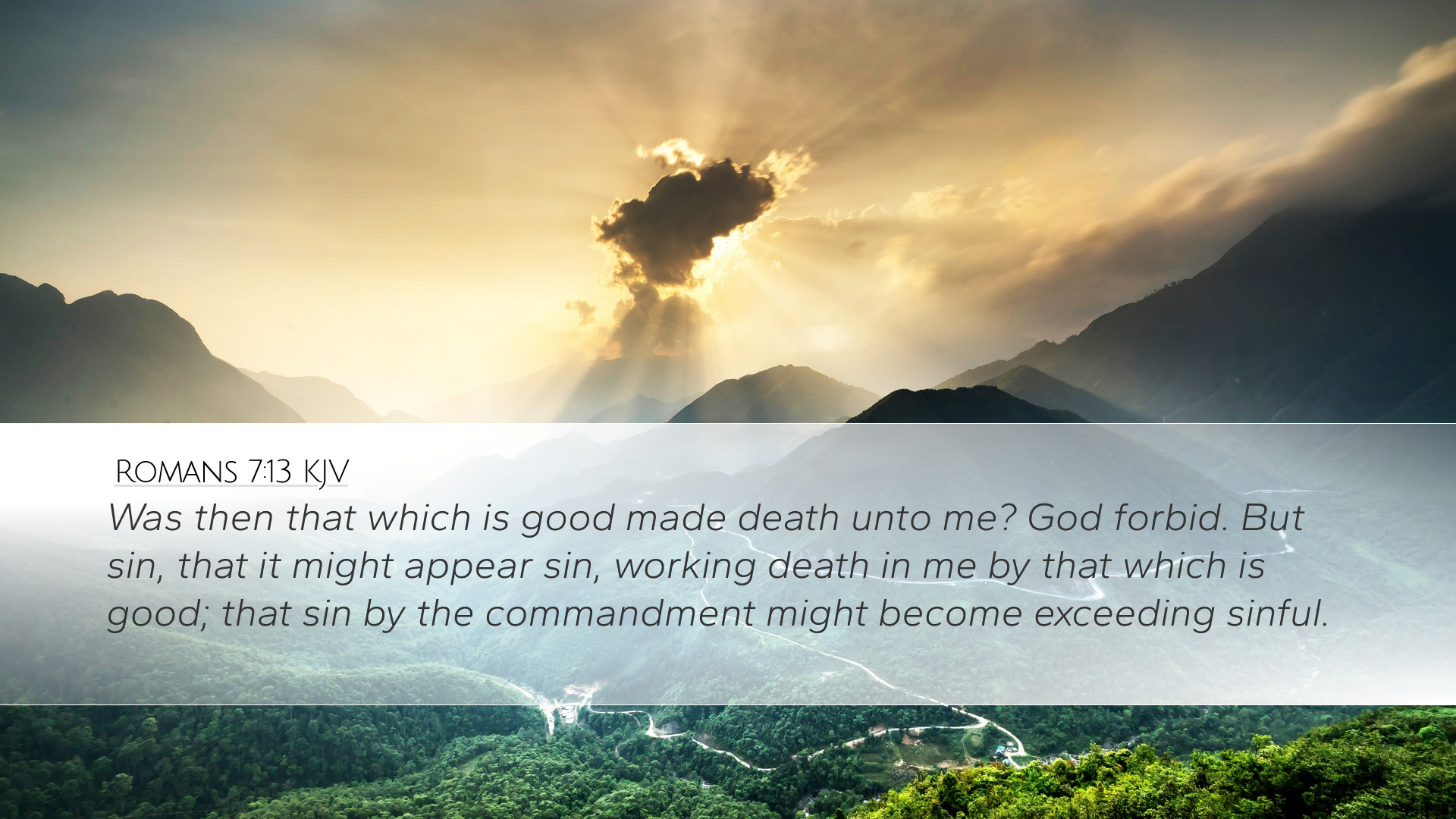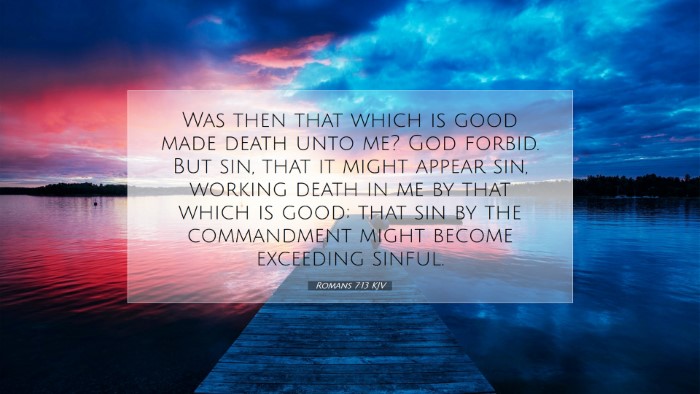Old Testament
Genesis Exodus Leviticus Numbers Deuteronomy Joshua Judges Ruth 1 Samuel 2 Samuel 1 Kings 2 Kings 1 Chronicles 2 Chronicles Ezra Nehemiah Esther Job Psalms Proverbs Ecclesiastes Song of Solomon Isaiah Jeremiah Lamentations Ezekiel Daniel Hosea Joel Amos Obadiah Jonah Micah Nahum Habakkuk Zephaniah Haggai Zechariah MalachiRomans 7:13
Romans 7:13 KJV
Was then that which is good made death unto me? God forbid. But sin, that it might appear sin, working death in me by that which is good; that sin by the commandment might become exceeding sinful.
Romans 7:13 Bible Commentary
Commentary on Romans 7:13
Verse: "Was then that which is good made death unto me? God forbid. But sin, that it might appear sin, working death in me by that which is good; that sin by the commandment might become exceeding sinful." (Romans 7:13)
Introduction
In Romans 7:13, the Apostle Paul explores the relationship between the law, sin, and death. This verse serves as a critical juncture in Paul's argument about the function of the Mosaic Law and its interaction with human nature. This commentary synthesizes insights from notable public domain theologians to clarify this complex passage.
Analysis of the Key Phrases
-
"Was then that which is good made death unto me?"
Paul begins by questioning the potential misunderstanding that the Law, which is inherently good, could lead to death. He emphasizes that the Law itself is not the source of death, but rather the condition of human sinfulness that distorts its purpose.
-
"God forbid."
This phrase serves as a strong denial of the notion that God's good Law could be responsible for death. The phrase is used by Paul to reinforce his theological position that sin, not the Law, is to blame for human death (Barnes).
-
"But sin, that it might appear sin."
Paul identifies sin as the true antagonist. He highlights that it is through the Law that sin becomes evident in its true form—sin is exposed in its exceeding sinfulness. The Law illuminates the deep-seated problem of sin within humanity (Henry).
-
"Working death in me by that which is good."
Here, Paul indicates that the good Law reveals sin's power, bringing about death as a consequence. Sin manipulates the lawful command to bring about destruction, showcasing its nature (Clarke).
-
"That sin by the commandment might become exceeding sinful."
This striking conclusion indicates that the Law amplifies the awareness of sin, leading to a more profound recognition of its wickedness. The commandment serves not only to point out sin but to highlight its grave severity and moral implications (Henry).
The Theological Implications
In this verse, Paul provides a keen insight into the paradox of law and grace. The Law cannot save; it merely accentuates the sinful nature of humanity. As explained by Albert Barnes, the true purpose of the Law is to reveal sin and lead to a recognition of the need for divine grace. The Law's goodness is preserved, showing that while it exposes sin, it is man's own heart that is wicked.
Furthermore, Adam Clarke emphasizes that understanding the Law's place allows for a critical grasp of Christian liberty. The realization that the commandments highlight human depravity ultimately points believers towards the redemptive work of Christ. This central theme echoes throughout the New Testament, affirming that grace supersedes the Law.
Application for Believers
As contemporary readers and followers of Christ, Romans 7:13 challenges us to reflect upon the role of divine commandments in our lives. It asks us to lead lives that respond to God's moral law, realizing its purpose is not to condemn but to illuminate our need for grace. Within this quest, making sin evident allows believers to foster a deeper appreciation for the redemptive power of Christ's sacrifice.
-
Awareness of Sin:
We are called to recognize our sinful nature, not merely as a means of guilt but as a catalyst for seeking restoration through Christ (Barnes).
-
God's Grace:
It is through understanding our limitation under the law that we are directed toward God’s infinite grace, enabling spiritual growth and maturity (Henry).
-
Prayer and Repentance:
Engaging in sincere prayer and repentance becomes essential in responding to the Law's revelation of sin, cultivating a heart aligned with God’s righteousness (Clarke).
Conclusion
Romans 7:13 encapsulates a profound theological truth regarding the nature of sin and the Law. Paul adeptly argues that while the Law is good, it is the sinful nature of humanity that separates us from God. In recognizing the exceeding sinfulness of sin, believers are led to humility and dependence on God's grace. This verse not only informs our understanding of Scripture but invites us into a transformative relationship with Christ.


